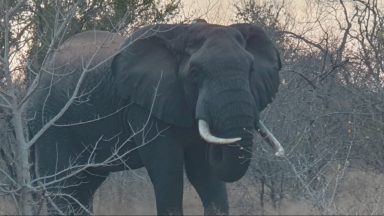Here, Peace Parks Foundation is with Ivan Carter of the Ivan Carter Wildlife Conservation Alliance, who has years of experience in wildlife conservation.
This helicopter is rounding up a young eland bull to be fitted with a GPS collar. Collars provide essential data on animal behaviour that informs conservation decisions for Peace Parks and their partners. Although there are lots of eland in other parts of Africa such as Namibia, Zimbabwe and so on, here in Mozambique they were once locally extinct. This eland is one that was recently brought back into the area from South Africa, so putting a collar on it will help to understand its movements and lifestyle.
Notice how the animal is blindfolded to ensure it is kept calm throughout the quick procedure. The collar itself is light and after one is fitted, the blindfold is removed, and the eland gets up and on with his life.
The eland is one of the largest of southern African antelope with some exceptional skills. It can maintain a trot indefinitely and can effortlessly jump a 2 metre fence from a standstill! Both males and females have tightly spiralled horns that give them their trademark look. As part of rewilding efforts, it is important to reintroduce these beautiful animals back into reserves as each animal has a different role to play in keeping ecosystems healthy and balanced.
In 2019, 20 of these magnificent antelopes leapt into their new home in Maputo Special Reserve from where the species had been absent for more than three decades. Peace Parks Foundation, in partnership with Mozambique’s National Administration for Conservation Areas and supported through funding from Mozbio, celebrated the event as one of the highlights of Peace Parks Foundation’s 2019 rewilding season. The reintroduction of each species takes Peace Parks one step closer to fully restoring balance to this reserve’s biodiversity.

